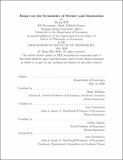| dc.contributor.advisor | Heidi Williams, Amy Finkelstein, and Joshua Angrist. | en_US |
| dc.contributor.author | Hill, Ryan(Ryan R.) | en_US |
| dc.contributor.other | Massachusetts Institute of Technology. Department of Economics. | en_US |
| dc.date.accessioned | 2020-09-15T22:01:51Z | |
| dc.date.available | 2020-09-15T22:01:51Z | |
| dc.date.copyright | 2020 | en_US |
| dc.date.issued | 2020 | en_US |
| dc.identifier.uri | https://hdl.handle.net/1721.1/127517 | |
| dc.description | Thesis: Ph. D., Massachusetts Institute of Technology, Department of Economics, May, 2020 | en_US |
| dc.description | Cataloged from the official PDF of thesis. | en_US |
| dc.description | Includes bibliographical references (pages 215-224). | en_US |
| dc.description.abstract | This thesis studies the economic forces that influence the creation of academic research and basic scientific knowledge. I study this from an empirical perspective, using administrative data from structural biology and observational astronomy, as well as detailed publication and citation data from many academic disciplines. These chapters illuminate the role of priority recognition in science, the effect of project failures on academic careers, and historical trends of extramural citation rates between social sciences and other disciplines. The first chapter -- co-authored with Carolyn Stein -- | en_US |
| dc.description.abstract | studies how the scientific community assigns credit or "priority to individuals who publish an important discovery first. We examine the impact of losing a priority race (colloquially known as getting "scooped" on subsequent publication and career outcomes. To do so, we take advantage of data from structural biology where the nature of the scientific process together with the Protein Data Bank -- a repository of standardized research discoveries -- | en_US |
| dc.description.abstract | enables us to identify priority races and their outcomes. We find that race winners receive more attention than losers, but that these contests are not winner-take- all. Scooped teams are 2.5 percent less likely to publish, are 18 percent less likely to appear in a top-10 journal, and receive 28 percent fewer citations. As a share of total citations, we estimate that scooped papers receive a credit share of 42 percent. On the whole, these estimates inform both theoretical models of innovation races and suggest opportunities to re-evaluate the policies and institutions that affect credit allocation in science. The second chapter studies the role of luck in the careers of scientists. Since the production of science is inherently risky, the allocation of resources, promotions, and publications may be based on noisy signals of ability. Therefore, success might be path dependent, such that lucky breaks early in the career are amplified into future recognition and opportunities. | en_US |
| dc.description.abstract | I seek to quantify the short- and long-run effects of exogenous project success and failure in the context of academic astronomy. Using weather conditions during telescope viewing sessions, I test whether project-level shocks have a lasting effect on publication and citation rates. I find that idiosyncratic weather quality increases publication and citation rates for novice astronomers, but does not affect the productivity of veteran astronomers. Good weather shocks increase the number of future telescope sessions novices are awarded, suggesting that lucky breaks may improve early-career opportunities. However, these positive effects on productivity are transient, lasting about four years before diminishing. The third chapter -- co-authored with Joshua Angrist, Pierre Azoulay, Glenn Ellison, and Susan Feng Lu -- | en_US |
| dc.description.abstract | studies extramural citation rates between academic disciplines. Does academic economic research produce material of general scientific value, or do academic economists write only for peers? Is economics scholarship uniquely insular? We address these questions by quantifying interactions between economics and other disciplines. Changes in the influence of economic scholarship are measured here by the frequency with which other disciplines cite papers in economics journals. We document a clear rise in the extramural influence of economic research, while also showing that economics is increasingly likely to reference other social sciences. A breakdown of extramural citations by economics fields shows broad field influence. Differentiating between theoretical and empirical papers classified using machine learning, we see that much of the rise in economics' extramural influence reflects growth in citations to empirical work. | en_US |
| dc.description.abstract | This parallels a growing share of empirical cites within economics. At the same time, some disciplines that primarily cite economic theory have also recently increased citations of economics scholarship. | en_US |
| dc.description.statementofresponsibility | by Ryan Hill. | en_US |
| dc.format.extent | 224 pages | en_US |
| dc.language.iso | eng | en_US |
| dc.publisher | Massachusetts Institute of Technology | en_US |
| dc.rights | MIT theses may be protected by copyright. Please reuse MIT thesis content according to the MIT Libraries Permissions Policy, which is available through the URL provided. | en_US |
| dc.rights.uri | http://dspace.mit.edu/handle/1721.1/7582 | en_US |
| dc.subject | Economics. | en_US |
| dc.title | Essays on the economics of science and innovation | en_US |
| dc.type | Thesis | en_US |
| dc.description.degree | Ph. D. | en_US |
| dc.contributor.department | Massachusetts Institute of Technology. Department of Economics | en_US |
| dc.identifier.oclc | 1193029230 | en_US |
| dc.description.collection | Ph.D. Massachusetts Institute of Technology, Department of Economics | en_US |
| dspace.imported | 2020-09-15T22:01:49Z | en_US |
| mit.thesis.degree | Doctoral | en_US |
| mit.thesis.department | Econ | en_US |
